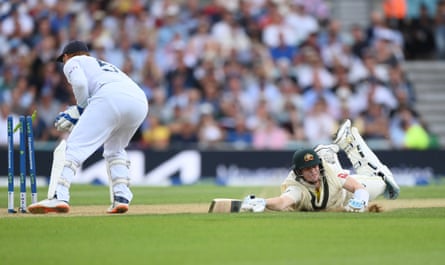In the final over of a dramatic second day in SE11 came a moment of inspiration from Ben Stokes; a wonderfully athletic boundary catch straight from the Twenty20 playbook that shut down Australia and turned this series finale into a straight shootout.
Stokes had spoken before this fifth Test about the skills of the shortest format only improving the appeal of its longer, more storied older sibling. While chiefly talking about batting, this was another example of the crossover – one of those juggling boundary-rope takes that have become de rigueur in white-ball cricket.
Pat Cummins was the last man to fall here – a second wicket for Joe Root, deputising for the injured Moeen Ali – and with it the tourists were finally bowled out for 295 in 103.1 overs. This was nearly twice as long as England’s 283 all out on day one and meant Australia, 2-1 up and chasing the outright series win, had a Rizla-thin lead of 12 runs.
Steve Smith had top-scored with 71 – an innings featuring a much-discussed run out that wasn’t – before a late surge from the lower order. Todd Murphy had arrived at 239 for eight, still 44 runs behind, and delivered an impish 39-ball 34 from No 10. Along with a resolute 36 from Cummins, this threatened to change the day’s complexion.
Because until the gutsy Murphy began swatting sixes like a bespectacled Brian Lara, this had been a hugely impressive performance from England. There was little of the funkiness that has become a hallmark of the Stokes era, rather a disciplined, tactically traditional approach that offered few release shots short or wide.
A man down due to Moeen’s groin injury, the remaining components of England’s attack – unchanged from Manchester – dovetailed smartly. Stuart Broad offered his usual crackle and mischief, while Mark Wood charged in despite increasing fatigue. Jimmy Anderson and Chris Woakes were the epitome of precision in the main, the latter claiming three for 61 in his typically unfussy way.
Facing all this was an Australian team almost looking to make a statement about their side of the much-discussed culture clash. Resuming on 61 for one, 222 runs in arrears, they were set on a grind, starting with a battle in the morning in which the umpires, despite England’s best efforts, were unwilling to change the ball. Usman Khawaja bunkered down at one end, Marnus Labuschagne even more so at the other. Just 21 runs came in the first hour before a relative explosion of 33 in the second.
There was one precious breakthrough amid the stalemate, however, Wood returning for a second burst before the break and delivering a beauty that caught the edge of Labuschagne’s bat before a spectacular one-handed catch from Root diving to his left. That said, this was Bairstow’s catch and once again he was rooted to the spot.

Perhaps credit should go to Broad, breaking the tunnel vision of this incredibly obdurate 82-ball nine from Labuschagne when, to induce a change of fortune, he cheekily swapped the bails around on the stumps between deliveries. Perhaps it came down to Khawaja turning his back on an easy single at the start of the over.
Either way, Broad was certainly the agent of chaos during an afternoon in which England picked off five wickets to leave Australia 186 for seven at tea. He produced yet another of those febrile bursts, pinning Khawaja lbw for a 157-ball 47 with his fifth ball of the session and nicking off Travis Head in the following over. The latter highlighted the overall orthodoxy, with the usual early bumper plan to Head mothballed.
There was some brief ambition from Mitchell Marsh, those coathanger shoulders and bulging muscles powering Broad back over his head for a straight six in a bid to disrupt his rhythm. But a return for Anderson produced his first wicket of the match, Marsh bowled off the inside edge for 16. The relief in Anderson’s celebration was palpable and Stokes, having backed his ageing champion, was particularly tactile.
after newsletter promotion
The strikes that followed before tea were easier pickings, a smart, loopy bit of bowling from Root seeing Alex Carey caught at cover for 10 the ball after launching a six, and Mitchell Starc bounced out by Wood. Instead, the chief talking point over a cuppa was the sub fielder, Surrey’s George Ealham, nearly making a Gary Pratt of himself.
Smith had been out there since late morning, following a couple of early driven fours off Anderson by getting his head down. On 43, turning for a second run alongside Cummins, he appeared to be the victim of a superb pick-up and throw from Ealham, completed when Bairstow demolished the stumps. Then came the replays, suggesting the wicket may have been broken by Bairstow before the ball nestled in his gloves.
There were mere frames in it, folks seeing what they wanted to and discussing things like spigots and grooves. A clarification from the law-makers at Marylebone Cricket Club later followed, endorsing the view of third umpire, Nitin Menon. Ealham, the 21-year-old son of former England all-rounder Mark Ealham, was denied Ashes immortality and Smith, this status already assured, ploughed on.
But not for too long, it transpired, Smith falling after the resumption when a thick top edge off Woakes was well held by Bairstow, running back. It meant a useful stand of 54 with Cummins – one that also took nine over of shine off the second new ball – was done, only for Murphy to emerge and deliver his freewheeling cameo.
Woakes eventually ended the fun before Stokes turned juggler on the rope. The fate of the Ashes was sealed by last week’s rain in Manchester but a series that began with a nail-biting one-innings shootout at Edgbaston may well conclude with another.

